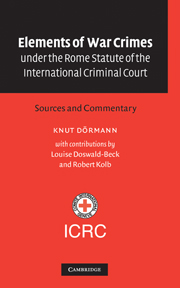 Elements of War Crimes under the Rome Statute of the International Criminal Court
Elements of War Crimes under the Rome Statute of the International Criminal Court Book contents
- Frontmatter
- Contents
- Foreword by Dr Jakob Kellenberger, President of the International Committee of the Red Cross
- Foreword by Ambassador Philippe Kirsch, QC
- Table of cases by alphabetical order
- Table of cases by jurisdiction
- Table of treaties and other international instruments
- List of abbreviations
- 1 Introduction
- 2 Legal value of the elements of crimes
- 3 General Introduction adopted by the PrepCom
- 4 Introduction to elements of war crimes listed in Article 8 of the Rome Statute
- 5 Article 8(2)(a) ICC Statute – Grave breaches of the 1949 Geneva Conventions
- 6 Article 8(2)(b) ICC Statute – Other serious violations of the laws and customs applicable in international armed conflict
- 7 Article 8(2)(c) ICC Statute – Violations of common Article 3 of the 1949 Geneva Conventions
- 8 Article 8(2)(e) ICC Statute – Other serious violations of the laws and customs applicable in armed conflicts not of an international character
- Appendix: Request from the Governments of Belgium, Finland, Hungary, Mexico, the Republic of Korea and South Africa and the Permanent Observer Mission of Switzerland to the United Nations regarding the text prepared by the International Committee of the Red Cross on the mental element in the common law and civil law systems and on the concepts of mistake of fact and mistake of law in national and international law
- Bibliography
- Index
8 - Article 8(2)(e) ICC Statute – Other serious violations of the laws and customs applicable in armed conflicts not of an international character
Published online by Cambridge University Press: 08 August 2009
- Frontmatter
- Contents
- Foreword by Dr Jakob Kellenberger, President of the International Committee of the Red Cross
- Foreword by Ambassador Philippe Kirsch, QC
- Table of cases by alphabetical order
- Table of cases by jurisdiction
- Table of treaties and other international instruments
- List of abbreviations
- 1 Introduction
- 2 Legal value of the elements of crimes
- 3 General Introduction adopted by the PrepCom
- 4 Introduction to elements of war crimes listed in Article 8 of the Rome Statute
- 5 Article 8(2)(a) ICC Statute – Grave breaches of the 1949 Geneva Conventions
- 6 Article 8(2)(b) ICC Statute – Other serious violations of the laws and customs applicable in international armed conflict
- 7 Article 8(2)(c) ICC Statute – Violations of common Article 3 of the 1949 Geneva Conventions
- 8 Article 8(2)(e) ICC Statute – Other serious violations of the laws and customs applicable in armed conflicts not of an international character
- Appendix: Request from the Governments of Belgium, Finland, Hungary, Mexico, the Republic of Korea and South Africa and the Permanent Observer Mission of Switzerland to the United Nations regarding the text prepared by the International Committee of the Red Cross on the mental element in the common law and civil law systems and on the concepts of mistake of fact and mistake of law in national and international law
- Bibliography
- Index
Summary
The crimes under Art. 8(2)(e) of the ICC Statute (crimes committed in non-international armed conflicts), although more limited in number, are to a large extent identical in formulation to the corresponding crimes under Art. 8(2)(b) of the ICC Statute (crimes committed in international armed conflicts). The PrepCom adopted the view that the specific elements (not the common elements relating to the subject-matter jurisdiction) accepted for the crimes under Art. 8(2)(b) should appear under the corresponding war crime under Art. 8(2)(e), unless the specific legal framework of a non-international armed conflict would preclude this.
Paragraph 1 of the introduction to the war crimes section
Paragraph 1 of the introduction to the war crimes section is particularly relevant to the crimes under Art. 8(2)(e). It reads as follows:
The elements for war crimes under article 8, paragraph 2(c) and (e), are subject to the limitations addressed in article 8, paragraph 2(d) and (f), which are not elements of crimes.
This paragraph emphasises that the content of Art. 8(2)(d) and (f) provides limitations to the jurisdiction of the Court, namely a description of situations of internal violence not covered by the Statute. Several interested delegations wanted to make sure that whenever the threshold for a non-international armed conflict as indicated in these provisions is not reached, the Court will not examine conduct occurring within a country. Therefore, this paragraph was added to the Introduction.
- Type
- Chapter
- Information
- Elements of War Crimes under the Rome Statute of the International Criminal CourtSources and Commentary, pp. 439 - 486Publisher: Cambridge University PressPrint publication year: 2003
